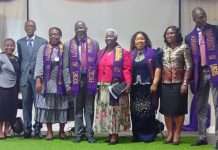
The Nigeria Centre for Disease Control (NCDC) has disclosed that no case of new COVID-19 variant, Omicron, has been found in Nigeria as at 28 November, 2021.
NCDC Director General, Dr Ifedayo Adetifa, said the Federal Ministry of Health (FMOH) and his agency are monitoring emerging evidence on the new variant and its implication, to inform Nigeria’s response to the COVID-19 pandemic.
Although he noted that Omicron has not been designated a variant of concern by the World Health Organisation (WHO), but it has been detected in several countries like the UK, Israel, Botswana, Hong-Kong, Germany, Belgium, Italy and counting. While no deaths have been attributed to this new variant yet, a total of 126 genomes of the variant have been detected globally and published on GISAID, (GISAID is a global mechanism for sharing sequencing data).
In a press release sighted by Pharmanewsonline, Adetifa on Monday doused the widespeade tension about the new variant evading protective immunse responses or being vaccine resistant, stating that though the variant is highly transmissible but it has still be detected with existing Polymerase Chain Reaction (PCR) tests. “However, the fears about its ability to evade protective immune responses and/or its being vaccine resistant are only theoretical so far. This virus can still be detected with existing Polymerase Chain Reaction (PCR) tests”.
He continued: “The WHO and researchers across the world are working at speed to gain understanding of the likely impact of this variant on the severity of COVID-19 and on the potency of existing vaccines and therapeutics.
“The Federal Ministry of Health (FMOH) and Nigeria Centre for Disease Control (NCDC) are aware of reports of a new COVID-19 variant – the B.1.1.529 lineage. This SARS-CoV-2 variant has now been designated a variant of concern (VOC) and named; Omicron by the World Health Organisation (WHO) as advised by the independent Technical Advisory Group on SARS-CoV-2 Virus Evolution (TAG-VE). WHO has also urged countries to enhance their surveillance and virus sequencing efforts to increase their understanding of the circulating variants.
“The FMOH and NCDC is monitoring emerging evidence on this new variant and its implication, to inform Nigeria’s response to the COVID-19 pandemic.
“The variant was first identified from testing done on 9th November 2021 in Botswana on travellers from West Africa. It was reported to WHO on identification of cases among a cluster of young unvaccinated people in South Africa on 24 November 2021″ he revealed.
The NCDC boss assured Nigerians on the agency’s efforts in ensuring daily review of surveillance data while using this to inform public health decision making. He urged all states to ensure that sample collection and testing are accessible, so that travellers, people with symptoms or who have been exposed to COVID-19 cases get tested promptly.
He said the NCDC, through the National Reference Laboratory (NRL) continues to coordinate genomic surveillance and other activities required for the detection of variants. The NCDC assumes global spread of this variant has occurred and it is prioritising sequencing of recently accrued samples from SARS-COV-2 positive travellers from all countries, especially those from countries that have reported the Omicron variant already.
In collaboration with Port Health Services of the Federal Ministry of Health, Adetifa noted that enhanced surveillance is ongoing at the airports and points of entry, and to ensure compliance with current travel guidance especially for the day 2 COVID-19 PCR testing. Should there be any changes to travel guidance, this will be communicated in due course.
To prevent widespread of Omicron variant and its emergence that is linked to unmitigated community transmission of the virus, the NCDC urged Nigerians to ensure strict adherence to the proven public health and social measures in place, which are enforceable by the Presidential Steering Committee on COVID-19 (PSC-COVID-19), through the COVID-19 Health Protection Regulations 2021.
“We are collectively responsible for our own health security including playing our part to reduce the risk of the importation or spread of the Omicron variant in Nigeria”, he warned.











